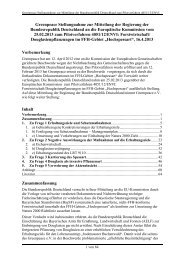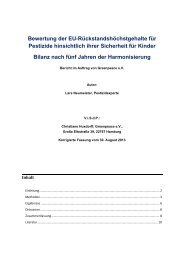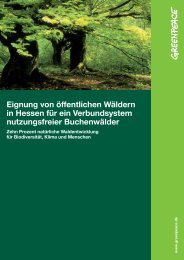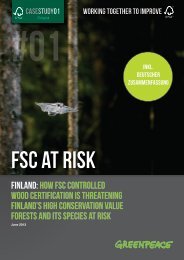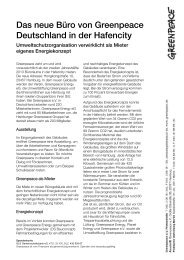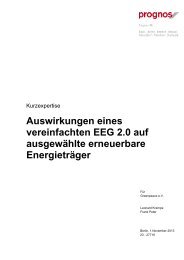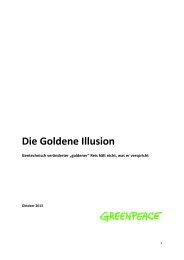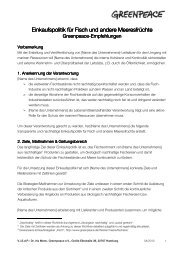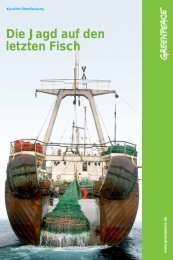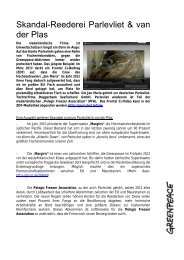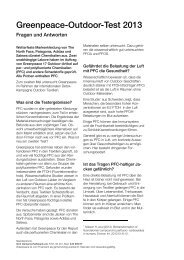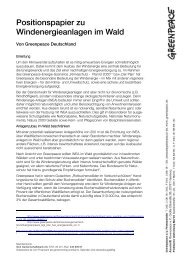Untitled - Greenpeace
Untitled - Greenpeace
Untitled - Greenpeace
You also want an ePaper? Increase the reach of your titles
YUMPU automatically turns print PDFs into web optimized ePapers that Google loves.
CARVING UP THE CONGO 77<br />
New government, new vision … or business<br />
as usual?<br />
Now is a pivotal time for the DRC: the coming<br />
months and years will show whether the newly<br />
elected Government has the political will to<br />
reform. At the same time, there can be no<br />
further excuse on the part of the World Bank<br />
and international donor governments to delay<br />
using their leverage to help combat corruption.<br />
Good governance and land use planning that<br />
involves all stakeholders must precede any<br />
industrial development. A wide range of<br />
stakeholders – from forest-dwelling<br />
communities to the wider world impacted by<br />
the growing instability of the global climate –<br />
all have an interest in the fate of the DRC’s<br />
rainforests. While climate protection and the<br />
safeguarding of community interests<br />
potentially share a long-term agenda, logging<br />
interests inevitably conflict with these.<br />
Good governance relies not only on stifling<br />
corruption, but also on educating and<br />
empowering local communities – only then can<br />
their participation in land use planning be<br />
informed and decisive. 463 Although this will<br />
inevitably be a long-term process, it is also a<br />
necessary precondition to genuine<br />
development. The fact that it takes time<br />
should not be used as an excuse in the<br />
meantime to give the private sector a free<br />
hand to extract natural resources in a way<br />
which pre-empts future options.<br />
The road to genuine development starts with a<br />
comprehensive moratorium on the expansion<br />
of industrial logging, to be maintained until a<br />
comprehensive social and environmental land<br />
use planning has been conducted and basic<br />
governance established. A moratorium will buy<br />
time to get the processes of equitable<br />
economic development and large-scale<br />
conservation right, and to establish effective<br />
systems of control to ensure that the<br />
extractive industries do not in future ride<br />
roughshod over the wider interests of the<br />
people and environment. Donors should use<br />
this unique opportunity to support an<br />
alternative ‘pro-poor’ vision with focus on<br />
forest community benefits and values and<br />
global environmental services.<br />
WHO NEEDS TO DO WHAT<br />
The international community, which has the<br />
power and resources to lead change in the<br />
DRC, must not permit the DRC to repeat the<br />
dismal recent history of other Central African<br />
countries, where reliance on the short-term<br />
economics of extractive export industries has<br />
exacerbated political corruption and poverty.<br />
Indeed, it should recognise that the industrial<br />
logging model of development does not work<br />
in a context of poor governance and does not<br />
generate the desired economic, social and<br />
environmental benefits.<br />
Punitive action must be taken against those<br />
companies and individuals who undermine the<br />
rule of law in the DRC. International aid to the<br />
DRC must be conditional on the meeting of a<br />
range of good governance principles to ensure<br />
the money is spent well – one such<br />
precondition being the rigorous<br />
implementation and enforcement of the legal<br />
review of existing logging titles.<br />
The international community must also<br />
support a new vision for sustainable<br />
development and environmental protection by<br />
ensuring that fully participative regional land<br />
use plans are developed and implemented prior<br />
to any expansion in industrial logging.<br />
Rich nations must together develop a<br />
permanent financing regime that maintains the<br />
environmental services provided by the DRC’s<br />
intact rainforests. They must also support<br />
environmentally responsible and socially just<br />
development based on community-level<br />
initiatives, and take much more stringent steps<br />
to close the international market to illegal and<br />
conflict timber.<br />
The international community must support the<br />
development of an international innovative<br />
financing mechanism that will provide the<br />
necessary funding for the long-term<br />
conservation of forests, to ensure that the<br />
safeguarding of intact forests is made much<br />
more economically attractive than their<br />
systemic industrial exploitation or clearing for<br />
agricultural conversion.<br />
‘[A]chieve by 2010 a<br />
significant reduction of the<br />
current rate of biodiversity<br />
loss at the global, regional<br />
and national level as a<br />
contribution to poverty<br />
alleviation and to the benefit<br />
of all life on earth’ 464<br />
Convention on Biological<br />
Diversity 2010 Biodiversity<br />
Target



